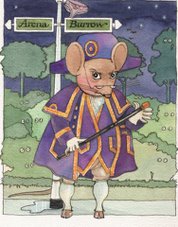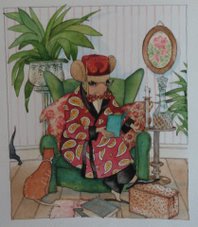My grandfather had a bachelor uncle who was his godfather, and after whom I believe he was named Thomas. My great-grandfather was an ironmonger and hardware merchant in Manchester, and his younger brother, Uncle Tom, was also a merchant in Ceylon [now Sri Lanka], from where he wrote some lively letters to my great-grandfather. I still have the holograph originals, penned in neat copperplate and deftly illustrated with pen-and-ink drawings of local ‘characters’.
In March 1866 Tom [then aged 27] writes from
‘In reply to your query I have to state that I am a full blown Freemason Irish Constitution & expect soon to receive my certificate. Masons in Ceylon are as a rule very quiet fellows; in fact in this hot country men dare not indulge too freely in liquors altho’ some I will allow take a “fair whack” -
To recur again to Masonry, it is widespread over
He continues:
‘As you say, the time since I left home has passed away very quickly, and my 3 years will soon be up - whether or not I shall stay I don’t know - it all depends upon [RBC] and [JB], who will no doubt come to some arrangement & it will be for me to say whether or not I am agreeable to further risk my liver &c for a further term of years - If they do the handsome I may and most likely will, but if there is no proper inducement, what’s the good - Life is a great drag out here I can assure you, compared with Home, & the only balm for it is to know you are making money. If you know you are not making money and the future is dark, then you are miserable in spite of yourself - time is passing cheaply [?] - year by year, and I must look well about me - so far I consider I have not done much. I must however wait and see.’
And
‘Didn’t go to Church last Sunday, but my Companion [B] did - he told me he felt very sleepy under the Native parson & was only fairly aroused when the said Native parson spasmodically ejaculated a prayer that we might be preserved in this “Wicked World of Wailing Weeping Woe”. The Bishop seldom preaches and Europeans are often absent, and it’s very dreary work going to listen to some of the Black ministers, although they are good men I have no doubt. The above expression of the parson’s was however a Crasher -
I am glad to say that I continue in very good health, and take plenty of Horse Exercise - it is expensive £45 a year with the risk of your horse dying, but it is far better to spend your money than spoil your liver - it is very disgusting, but people out here are perpetually thinking about their livers -
Trade keeps exceedingly quiet in “Rags” - i.e. cotton goods - and unless a change takes place soon we shall have to pocket a loss instead of a profit .’
The next letter is undated, and is largely about trading matters. But there are some illustrations:
1.
3.
Tom comments: Figures 1 & 2 represent the class of men to whom the shipment of nails would be sent. Do not despise the Old Buffer no 2 - when I came out first an honest old fellow in similar “get up” was worth £50000 ! Very few like him left.’
Reverting to family affairs, he says nostalgically ‘ In my reveries of home I think now & again of those little trips we used to take when lads with Father to the
[I too remember trips to Wilmslow and Alderley Edge with my grandparents when I was a child.]
Uncle Tom’s third letter was written much later, in 1896, by which time my great-grandfather was dead. It is addressed to my grandfather, and dated three days before my grandparents’ marriage: Tom had stayed on in
Smedley’s Hydropathic Establishment
Telegraphic Address, “SMEDLEYS” Matlock Bank. Railway Station,
MATLOCK, 17th April 1896
‘My dear Nephew Tom,
This will I hope find you safely returned to Gransmoor after your, probably, stormy journey to and from
Hebe [my grandfather’s eldest sister] has very kindly informed me fully with respect to matters that so nearly concern yourself, and which are now on the eve of accomplishment - I refer, of course, to your approaching marriage with Miss Gartside.
Altho’ I shall not be able to witness the ceremony at St. Peter’s, Ashton, next Monday, I shall be there in spirit you may be sure.
I am pleased to learn that it is to be a very quietly arranged function - Emblematic, in that respect, I trust of the tranquil life before you both when you get fairly settled in your own little nest at Heaton Chapel. I have seen the house and it has a pleasant outlook.
It is customary, I know, on occasions like this for Uncles to accompany their letters of congratulation & felicitation with something substantial in the form of a suitable presentation, and your being, moreover, my Godson naturally makes it all the more incumbent on me to conform to the ‘good old rule’. How gladly I would do this, were I able, it is needless for me to tell you. The opportunity can now only arise and be embraced and availed of “when my ship comes in”, and when that will be is known only to the Gods! -
I now send you and Miss Gartside my sincerest wishes for your present and future happiness, health, prosperity and long life,
and remain Your affectionate Uncle Thos. Wright.’
This is where the mystery begins and ends – because Uncle Tom was never seen or heard from again. He vanished from Smedley’s Hydro without trace, and no-one ever discovered what had become of him. As time went by, there were various theories: he had fallen down a pothole, either by accident or by committing suicide in a fit of depression. Or he had decided to return to
What I do know is that I wish I could have met Uncle Tom and heard more of his stories about life in


8 comments:
Lovely stuff, Anti.
More please.
IT Is amazing, to me at least, at what a gulf now separates us from our victorian forebears; and, yet, how close these transcriptions can bring one to them, in spirit. The great difficulty is that they seem to have worn entirely altogether too many clothes and, in crowds in August, I daresay were rather /perspirant/ to be around. But, as well as ourselves, they were plainly bedevilled by all of the selfsame heebie-jeebies we so quaintly consider 'unique' to our languid & drivelling post-modernity; /ennui/, vague dreads & the odd outbreak of sado-masochistic prostitute-murder, by members of the lower orders. (In all of that, the discerning reader of course may detect in my terms, to-day, the long shadow that Mr Lytton Strachey first cast 90 years ago, over our over-freudianised attitude toward these same Victorians.) I had a great-grandfather who introduced syphilis into the family circle, here at home on southern Minnesota; and, who got his fool self cleaned out publicly, in an humiliating divorce-action here in this selfsame (and, then, VERY stuffy!) southern Minnesota! His wife, my great-grandmother, in 1905 or so simply gave a boot in the arse to any idea that the wife was under any constraint whatsoever, to maintain privacy in such a case; and, so, she got half of her vagrant poxster's land & money: to provide educations for her daughters, /so that they at least should have the choice to become schoolmarms and not 'have to' get married to some oaf hereabouts that likely as not beat its horses/. My grandmother was, indeed, the only daughter to marry after all of that -- to my grandfather, who did /not/ abuse his animals! The consolation for you, Aunty, of course, is that in these reports at least none of your people appear to have had the gleet...but, /I am/ perplexed by what may be a 'pothole'? Did they? smoke indian hemp so very widely, then, in those good old times? Or, is it a unique-to-Matlock geological menace of some sort, to trippers?
A pothole is a small cleft in the ground opening into an underground cave, often with a swiftly flowing river and connecting to a network of other caves which may extend for miles. There are many such caves in the Derbyshire Peak District around Matlock, and elsewhere in the Pennines. Potholing and underground cave exploration is a popular local mountaineering sport.
WHEN I was "a little bastard," here and "not [yet, /eg/] big enough to shit on a chip!" we used to have peat-fires; these could, would, smolder along for years /just under ground/ in the peatbogs, on the margins of gradually drying-out prairie pothole lakes. One doesn't hear lots about these anymore. My Great-Uncle Magly managed walking along one time in the Fall, out hunting "with a skinful," to break through and plunge into one of these but scrambled right out of it before he "singed my prick!" He also threw his shotgun to safety too. Peat, when it is farther along over the hundreds of years, becomes a feathery black loam. It is powdery and, when dry and you are "ploughing corn," as you go up and down on the old John Deere 630 tractor with a tractor-mounted boom-cultivator, it throws up a dust that itches "to beat Hell!" This organic powder reacts with sweat to "burn like Hell," too....
Highly engaging stuff, thanks for responding and posting this anticant. I love the use of language and the descriptions. A shame that the truth will probably never come to light: knowing Matlock to the extent that I do helped, I think, to make the final part of this piece very atmospheric. (A couple of years ago I stayed at a place a stone's throw from where I presume Smedley's was.)
I agree with Emmett's point too about the gulf which separates us from such forebears, but then again how that gulf can be bridged by such writings.
History - not least that of our own family - calls for empathy: that human quality which was briefly fashionable in the 1960s and '70s but has been displaced by the widespread postmodern "Blow you, I'm alright" attitude.
Having had the great good fortune of growing up with an aunt who was absorbed in history and literature, I took to it like a duck to water and have always had, since childhood I think, a historical imagination which endeavours to revisit the past without importing mental baggageloads of stuff which hadn't then happened.
After all, my grandparents grew up in the Victorian era, and told me about it, so I do feel fairly familiar with Uncle Tom and his generation.
I am going to read this at bedtime..and thoroughly enjoy it ! xx
oil give it 5
Post a Comment